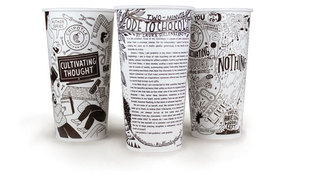 loading
loading
Arts & CultureTaking Chipotle at its wordObject lesson: Literature, served up hot and sometimes spicy. Amy Hungerford is a professor of English and divisional director of the humanities at Yale.  Mark Zurolo ’01MFAChipotle’s literary offerings on bags and cups, written by distinguished contemporary authors, can now be digested in the Beinecke Library. View full imageSoda cups and fast-food take-out bags have recently found their way into the Beinecke Library—into the Yale Collection of American Literature, that is. In 2014 Nancy Kuhl, curator for poetry at the Yale Collection of American Literature, acquired the full series of Chipotle Mexican Grill’s “Cultivating Thought” bags and cups, each embellished with a short piece by an acclaimed contemporary author recruited by the curator of the series, novelist Jonathan Safran Foer. The packaging joins bumper stickers, lapel pins, public transportation banners, and matchbooks, all items that have carried the words of American writers beyond the confines of the book. Pick up a cup or bag, then, at your local Chipotle or in the Beinecke Reading Room. My chips and guacamole on Chapel Street came bagged thusly: “The world is complicated. But does every problem require a complicated solution?—Stephen J. Dubner.” Dubner, coauthor of the Freakonomics books, illustrates on the back of the bag how simple solutions are often better. Other items in the series serve up similarly inspiring ideas with varying degrees of panache. Where was the literature? Jonathan Franzen uses his bag to reflect on traffic signage and our trashed planet. Sue Monk Kidd, reflecting on Rainer Maria Rilke’s Letters to a Young Poet, is grateful for how that book taught her to drop the quest for answers and instead to “love the questions.” Then lift Colson Whitehead’s cup. We taste this opening sentence near the rim: “Amy and Tad unplugged the cable box, rebooted the router, unscrewed the coaxial, and even replaced the triple A’s in the remote, just in case. They called the cable provider and followed the patient young man’s instructions: nothing. That’s when they got the exorcist.” How could I stop? Amy and Tad try several exorcists, who run away screaming. “Then came Larry, who’d driven the poltergeists from the Greenport Home for the Elderly and once hog-tied an apparition of Beelzebub, or so it said on his website.” If there were root beer in that cup I’d be dumping it, the better to tip and read. Toni Morrison doesn’t disappoint, either. Her “Two-minute Seduction” offers a meaty come-on: “I took my heart out and gave it to a writer made heartless by fame, someone who needed it to pump blood into veins desiccated by the suck and roar of crowds slobbering or poisoning or licking up the red froth they mistake for happiness because happiness looks just like a heart painted on a valentine cup or tattooed on an arm that has never held a victim or comforted a hurt friend.” M. T. Anderson, a writer of science fiction, delivers virtuosic literary turning. His bag is about single friends who have tried speed dating without success and decide to host speed break-up events instead. One Friday, the narrator tells us, “A woman sat down across from me and announced, ‘I don’t have time for this anymore.’ As she accused me of passing out drunk in her friend’s inglenook, we had to struggle to keep from laughing....Toward the close of the segment, as time grew short, I think we both wanted to exchange numbers and names, to play a different game. These things have their format, however. She reached toward my wrist, but I knew the rules: it was over between us. I reared back. She blinked in surprise....” Just think for a minute—or two minutes—about how the writer and characters play with time, with form, with rules. Where did that delicious word—“inglenook”—come from? Enjoy it with salsa...but not in the Reading Room.
The comment period has expired.
|
|